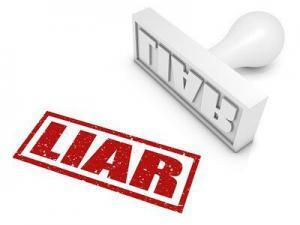
Whilst it is true there are some downsides to the Internet and that paedophiles do hide their true identity, research shows that people are MORE honest online than they are in the “real world”. Part of the reason is that what we say online is so much more public. When you are in the pub with your mates you can be “economical with the truth” because the impact of being exposed as a fibber has fewer consequences – an embarrassed giggle and the offer of drinks all round. Lie online and you have to make public apologies, maybe even have thousands of Tweets complaining about the error of your ways. Making things up online can lead to difficulties which lying in private does not have.
One area in which people are known to consistently lie is in job applications. Several studies show that the typical résumé or CV is littered with inaccuracies. Indeed, around 85% of people lie on their CVs apparently. Lying is so commonplace that recruitment companies only take CVs with a pinch-of-salt and have developed all sorts of techniques to test the veracity of what they read.
So, now that millions of people publish their résumés online at LinkedIn, for instance, just how accurate are the claims on those profiles. If people have been lying on CVs for years and if the Daily Mail readers are right and that the web is full of liars, then you can bet your last Facebook Credit that LinkedIn profiles would be a pile of rubbish.
But new research shows this not to be true. Indeed the research shows that LinkedIn profiles are MORE TRUTHFUL than printed résumés. The only difference is that we tend to be more “economical with the truth” in regards to our hobbies.
Once again, this study confirms earlier research which shows that people are more honest online than in the real world. The “bigging up” of hobbies on LinkedIn is not that significant – after all, that’s a common “real world” activity as people explore potential common connections with each other. What you can be sure of online, it seems, is that the information you read about people is mostly true – and you cannot say the same when you meet them for real or read their CVs.
Rather than fussing ourselves with worrying about whether or not people are truthful on social networks, we should put more of our efforts into dealing with those real liars, the people who really do lurk behind fake identities.
Related articles
- Don’t be too honest on Facebook (grahamjones.co.uk)
- The Ultimate Cheat Sheet for Mastering LinkedIn (hubspot.com)
- 11 LinkedIn Marketing Gems You’re Missing Out On (hubspot.com)

